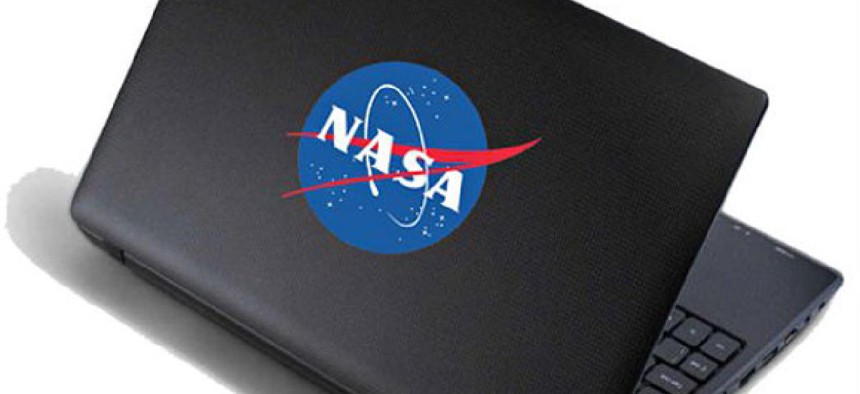Costs mount as NASA responds to October data breach

NASA
Agency accelerated laptop protections after Oct. 31 theft compromised data on 10,000 employees.
The fallout from the theft of a NASA laptop bearing personal information on 10,000 current and former agency employees could cost taxpayers nearly $960,000, according to the space agency’s inspector general.
On Oct. 31, an unencrypted machine was taken from the vehicle of a female NASA headquarters employee. The breach -- the fourth serious laptop theft since March 2011 -- prompted immediate action to encrypt the hard drives of all agency laptops by Dec. 21.
Credit-monitoring expenses for the personnel affected could total as much as $700,000. The machine stored hundreds of records containing Social Security numbers and other sensitive information. As a result of the incident, NASA bumped up the deadline for a long-delayed encryption plan from March 2013 to December at a cost of $259,000.
But NASA’s watchdog doubts the agency will hit the new due date because officials don’t know how many laptops the agency owns. In addition, technical difficulties that disrupted earlier encryption efforts remain.
“In our judgment, it is extremely unlikely that the agency will meet its December goal primarily because the agency does not have a full account of the number of [NASA] laptops in its possession. Without knowing the full universe of laptops that require encryption, the agency cannot be sure that all of its laptops are protected with whole-disk encryption software,” meaning software that renders hard-drives unreadable, NASA IG Paul Martin wrote in a new report.
The “special review” did not include a written response from NASA officials.
On Tuesday, NASA officials said they might miss the due date, but not by much. “While NASA may not make its self-imposed deadline of Dec. 21 for encrypting all laptop computers (missing it by just a few working days), the agency has been working overtime to achieve this goal, encrypting more than 32,000 laptops, 3,000 just last week,” NASA spokesman Michael Braukus said in an email.
Ames Research Center just imposed even stricter security rules because two more laptops, both unencrypted, were stolen within 10 days after headquarters announced the new encryption policy, according to Martin. Employees there are now prohibited from taking any laptop off the Ames campus that is unencrypted, and they are required to hand in any unencrypted laptops at home or elsewhere.
As of Dec. 7, NASA was tracking the encryption status of more than 34,000 laptops total, Martin wrote.
Past instances of major data breaches include a laptop containing International Space Station commands stolen in March 2011 from the car of a Johnson Space Center employee. In March 2012, a portable computer, access badge, and a token used to remotely access the agency’s network were nabbed from a car parked in the driveway of a Kennedy Space Center employee. That laptop held the names, Social Security numbers, and other personal information for 2,400 NASA civil servants, as well as two sensitive program files. In addition, an unencrypted laptop containing sensitive information technology security information was grabbed in November 2011 from the vehicle of an Ames employee.
Under a December 2010 contract for laptop equipment and services, NASA and HP were supposed to encrypt all new machines by Nov. 1, 2011. Because of a contract protest, software compatibility issues, difficulty connecting the software remotely, and employees’ reluctance to begin the lengthy installation process, the deadline was pushed back to March 2013. Only ill-defined “critical users” were prioritized for installation by Nov. 16, 2012, according to the report. “For this reason, the headquarters employee whose computer was stolen on Oct. 31 was not identified as a critical user and her laptop was not encrypted as part of the [software] rollout to critical users,” Martin wrote.
Casting more doubt on the Dec. 21 deadline is the fact that the departmentwide chief information officer traditionally is powerless to enforce security dictates at NASA divisions, Martin said. “Although federal law and NASA policy designate the headquarters-based CIO as the official responsible for developing IT security policies and implementing an agencywide IT security program,” auditors continue to find that the CIO has “limited ability” to order that NASA directorates follow mandatory security programs, he wrote.
Braukus said that NASA appreciates the inspector general’s assessment and takes information security very seriously. He stressed that the agency has expedited its commitment to hardening all agency laptops, “encrypting more than 11,000 agency laptops in just the last few weeks.”
Scientists under contract to NASA’s Jet Propulsion Laboratory, who already are incensed over compulsory medical-stability background checks, have called on Congress to investigate the latest breach. Some of the compromised data, they claim, includes material gathered by background investigators.
On Nov. 28, lab employees requested lawmakers probe NASA’s two-week delay in notifying staff that their data was compromised and they were at risk of identity theft. Headquarters alerted personnel through a Nov. 13 memo.
“It is outrageous that low risk employees have to needlessly reveal highly personal information. To add insult to injury, NASA recklessly allows repeated releases of this private information. This is a scandal and a shame,” Dan Stormer, attorney for the lab employees, said in a statement. Stormer argued a pending Supreme Court case related to the allegedly invasive background checks.
On Tuesday, Braukus responded that, as U.S. citizens, the lab employees are entitled to ask their congressional representatives for assistance.
--
This story has been updated to add comments from NASA officials.NEXT STORY: Insider attack; User accounts compromised






